AHEAD of Glasgow later this month, four Queenslanders tell how striking Commonwealth Games gold changed their lives.
ANDREW BAILDON 42, SWIMMER
Quadruple gold medallist, Auckland (1990); gold at Victoria, Canada (1994)
Andrew Baildon, aged two, sank to the bottom of his family’s Gold Coast pool and nearly drowned. His older sister, Kate, dived in and saved him but the incident horrified his mother, Kathy. She booked her son into swimming lessons five days a week and so began Baildon’s swimming career that saw him make his first Australian team at age 15. At 17, while in Year 12 at The Southport School, he went to the 1988 Seoul Olympics where he made the finals in the men’s 50m and 100m freestyle. He went on to win five Commonwealth Games gold medals (50 metres and 100m freestyle, 100m butterfly and 4 x 100m freestyle relay in Auckland, and 4 x 100m freestyle relay at Victoria, Canada), two bronze (4 x 100m medley in Auckland and 100m freestyle in Victoria), and was the first man in the Commonwealth to break 50 seconds in the 100m freestyle. He also was on the team for the 1992 Barcelona Olympics.
Baildon, now 42 and living at Ashmore on the Gold Coast, says the Auckland Commonwealth Games were especially memorable. “Being able to compete in a country very close to your own with a lot of Australians in the crowd was an amazing experience,” he says. “It was a wonderful meet and a really great event to be involved in.”
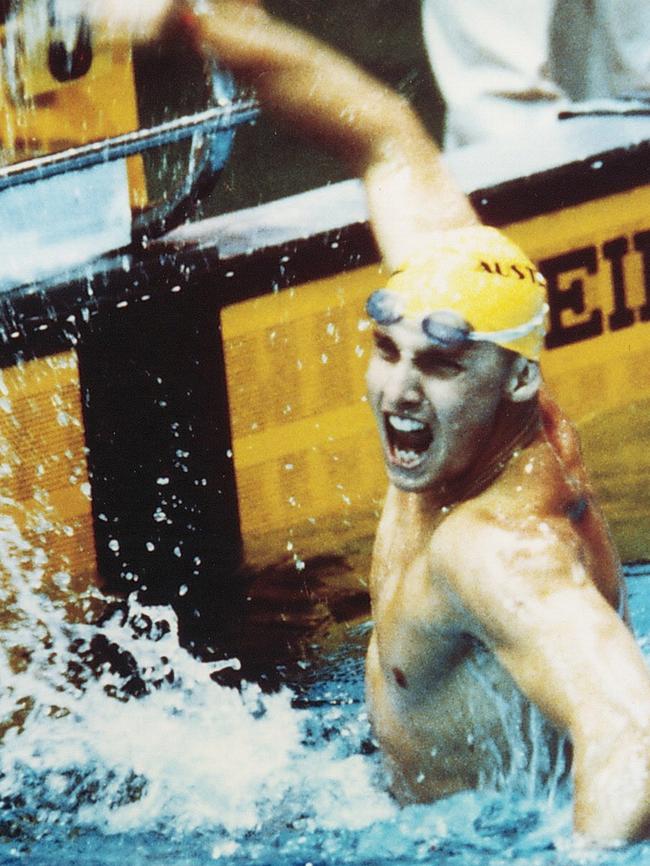
Baildon retired in 1996, aged 24. He had a shoulder injury, but a family tragedy had also taken its toll. The previous year his eldest sister, Kate, died from breast cancer, at 31. He has another sister, Anna, 48. Both siblings were state and national level breaststrokers. “In many ways, I lost my drive. It had a significant effect on me,” Baildon says. “I had a very close relationship with both Anna and Kate. They always made sure they came to the events I was competing at. Particularly Kate … she flew to the Pan Pacific Games in Japan in 1989 and came to the World Championships in Perth in 1991. She was at the Olympics in 1988, the Commonwealth Games in 1990. I have a lot of great memories of those times.”
Baildon says he struggled with life after swimming. “I wish I’d just taken six months off, regrouped and got back into it,” he says. “It was an extremely difficult transition to make. With sport, it’s not something you slowly move out of. It’s sudden. One minute, you’re an elite athlete, the next day, you’re not. And that’s the real difficulty athletes find. I missed the travel and the discipline and also being so supremely fit. You don’t have the time to train at that level again. Relationships with other people change too. When you’re an athlete and you’re performing well, everyone wants to know you. When you retire, they just move on to the next athlete. It’s the same with politicians. I understand that but, at the time, as a youngster, it’s a difficult adjustment to make.
“I’ve helped some other athletes through that process … the athletes I speak to now, I tell them to stay in the sport as long as they possibly can because it’s an absolute privilege to be able to perform at that level and have those experiences.”
Baildon, son of former Gold Coast mayor Gary Baildon, worked in his parents’ newsagency and sought various jobs to fit with his communication/business degree before “reluctantly” taking over operation of a struggling swim school at Southport. With his wife of 16 years, Karen, he now operates two Superfish Swim Schools at Sunnybank (in Brisbane’s south) and Pacific Pines (on the Gold Coast), two Jetts 24-hour gyms and a cafe.
Baildon met Karen, 42, a former state-level swimmer and daughter of Australian Olympic swimmer Michael Wenden, when they were eight. They competed together and her parents operated the Palm Beach pool for Gold Coast City Council, where Baildon sometimes swam. He and Karen, a former Miss Australia, have two children – Yasmin, 20, a model, and Flynn, 13, in Year 8 at school.
Baildon, who doesn’t rule out a future political career, says that for the moment he is enjoying “giving back to the sport” with his role on three committees for the 2018 Gold Coast Commonwealth Games. “It’s a wonderful Games to be part of,” he says. “Now that I look back, [swimming] was a small portion of my life but it really does help define your life in terms of things you learn and the friendships you make.”
BRONWYN THOMPSON 36, LONG JUMPER
Gold medallist, Melbourne (2006)
It was a moment she’ll never forget, one she’d dreamt about for a long time. Thompson, in the sand at the end of the long jump pit, knew she had won gold. It was redemption for the years of pain, injury, bad luck and under-performance. At that moment, it was all worth it.
Thompson, of Runcorn, in Brisbane’s south, retired as a long jump competitor in 2009. She is now a senior physiotherapist in paediatrics for Children’s Health Queensland, a part-time long jump coach at Moreton Bay College and a Queensland Academy of Sport board member. She is also mother to three young children – Jacob, 4, Isabelle, 3, and Zali, 18 months – with another baby due in October.
Thompson, also a three-time Olympian, is justifiably proud of her achievements. “Most people want a little bit more than what they achieved. At least, I can look back and know I overcame the adversity of injury. I was able to win a Commonwealth Games gold medal in my home country, which made it all that more special,” she says.
Born in Rockhampton, Thompson moved to Brisbane in early primary school with her family – dad Brenton, mum Sandy and siblings Raeleen, 42, Dale, 40, and Janelle, 38. She went to her first long jump state titles at age ten, was competing at national level at 13 and had a national title at 16. Thompson graduated from MacGregor State High School, in Brisbane’s south, and did a year of a human movement degree at Queensland University of Technology, before changing to physiotherapy at the University of Queensland and then taking three years off the sport.
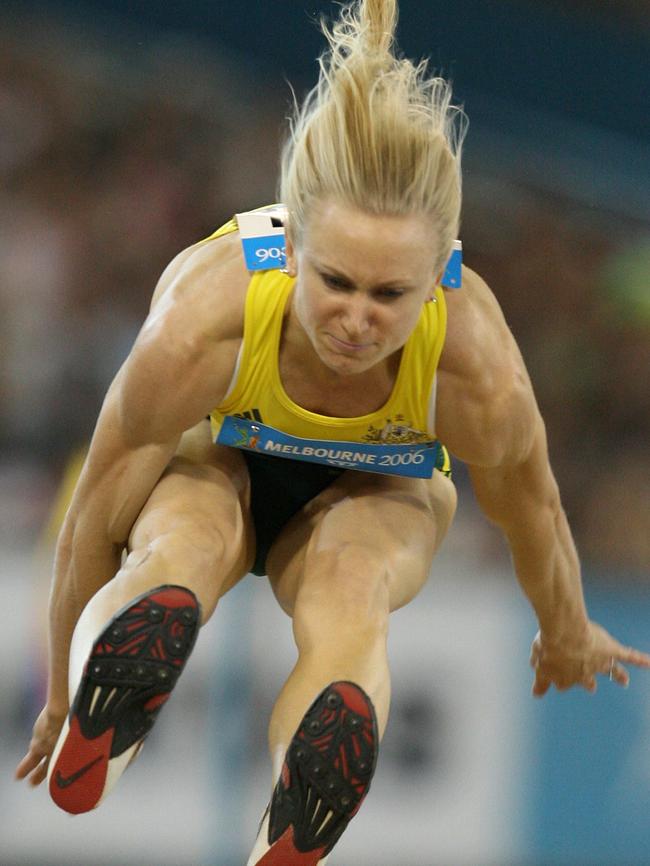
From 18 to 21, Thompson worked in a Brisbane CBD nightclub where she started dating fellow employee Jason Chipperfield, her husband-to-be. She also had part-time jobs as a physio assistant and personal trainer. “I didn’t prioritise my athletics at that stage.” She says she did “a bit” of training in her final year of university before signing up with her career coach, Gary Bourne, in April 2000. “The reason I came back to athletics was because everything else was stable in my life – I’d already met Jason, I had a full-time physio job.”
By September she was at the Sydney Olympics, where she narrowly missed the finals. Thompson then had surgery to remove a benign tumour from her take-off ankle. She went to the Manchester Commonwealth Games in 2002 ranked No 1, having set Australian and Commonwealth records – however, she “bombed out” and came sixth. “I was really devastated. I was distraught,” Thompson says. “That was very much fuel to me to make the Melbourne Commonwealth Games and to win.”
In 2003, she underwent knee surgery and came fourth at the 2004 Athens Olympics, the best result in Olympic or world championship history by an Australian woman long jumper. A week later, in Italy, she suffered a horrific knee injury while competing and it took her 13 months to return to the runway. “There were times I did doubt my capacity to come back from that injury,” she says. “I would be in tears at training because everything hurt. I remember stepping out of the pit in Melbourne being so elated because of all the work I put in.
“It was such an emotional time for me. Putting it in perspective, it was an injury, it wasn’t cancer or anything, but I felt with the journey I’d been through that it was an amazing achievement. There are plenty of athletes who achieved more but, to me, that moment in Melbourne I will claim as the pinnacle. The Commonwealth Games will always be really special to me.”
Thompson married Chipperfield a week after the Melbourne Games. She went on to compete at the World Championships in 2007 and the Beijing Olympics in 2008 before retiring. Her Australian record of 7m, achieved in 2002, and her 2006 Commonwealth Games record of 6.97m still stand. “When I did retire, I already had a full-time job so I integrated back into life quite easily,” Thompson says. “And I fell pregnant a month later, so I immediately had a different focus. The transition for me was not that hard.
“Sport helped to round out my life. It gave me an opportunity to travel. It fulfilled me in ways that my professional career was not able to. I wouldn’t have realised what else there is in life. It’s helped with my professional career too, having exposure to different political environments.
“I’d do it again, absolutely, no hesitation.”
KENRICK TUCKER 54, CYCLIST
Gold medallist, Edmonton (1978); Brisbane (1982)
In Rockhampton, the Tucker name is synonymous with cycling. The city’s Kenrick Tucker Velodrome stands in honour of the man who brought home gold from consecutive Commonwealth Games. Tucker, also a dual Olympian (Moscow, 1980, and Los Angeles, 1984) and ten-time Australian champion in a variety of events, won gold in 1978 in the 1000m cycle sprint and silver in the time trial.
In 1982 in Brisbane, with the hysteria of a local crowd behind him, he won gold again in the 1000m sprint, despite battling glandular fever. “Brisbane was like racing in my home town. It was really fantastic. How lucky was I?” Tucker reminisces. “I still remember marching into the stadium. It was unbelievable. I was actually not well during those Games. It wasn’t ideal but I still competed and, for me, that was my greatest event because it was a personal battle with sickness to get through it.”
Tucker’s legend was cemented with the opening of the eponymous velodrome in his home town in 1983 – the training ground for a new generation of cyclists. During his cycling career, Tucker attained his motor mechanic’s apprenticeship and worked full-time for the city’s electricity board.
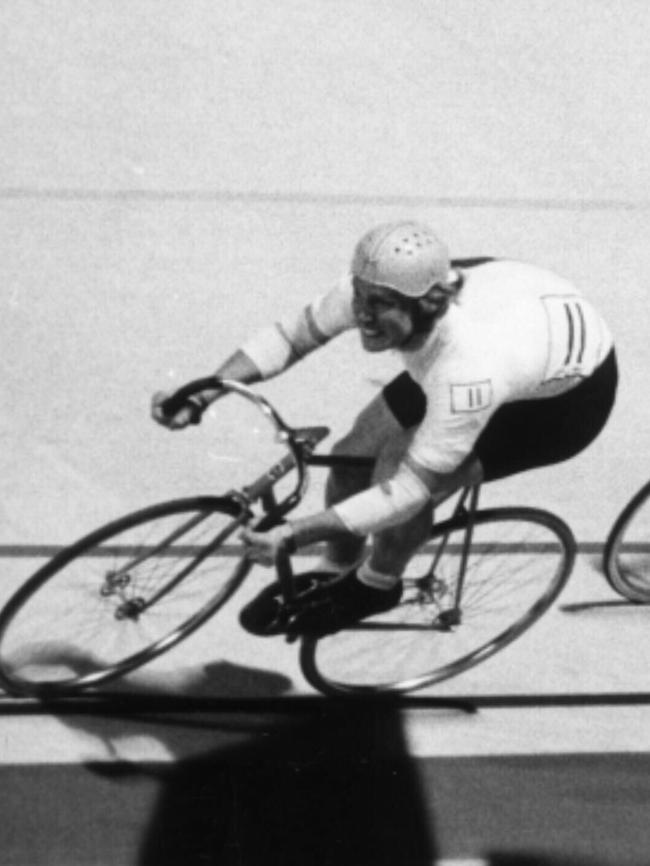
“You’d get up early and go to training and then go to work, leave work, go to training, come home in the dark and do it all again the next day,” he says. “My boss let me go for competitions but it was sort of frowned upon. Now they would have made a big deal of it and used it as positive publicity, but it was different then.”
Tucker, who lives with his wife of 29 years, Karen, in West Rockhampton, retired from cycling after missing out on selection for the 1986 Commonwealth Games. He has since enjoyed a successful 25-year career as an airport firefighter, working as fire commander for Air Services Australia. But the transition to “the real world” was not easy. After bowing out of sport, he worked as
a car salesman, a motor mechanic and had his own process-serving business. He also spent a year as a nightclub bouncer in a misguided attempt, he says, to experience the nightlife he’d “missed out on”.
“When you’re training, racing and travelling, you live in a different life, in a cocoon,” Tucker says. “Coming back to the reality of normal life was very hard. It was a big change, and a lot of athletes find that. You use what you learned for the next part of your life.”
Tucker was trained by his father Ken, 79, who was also a representative cyclist. Ken still coaches cyclists, including Kenrick’s daughters – Brooke, 16, and Lara, 14. Tucker himself has continued to ride “on and off” over the years and won a World Masters Championship in Brisbane for sprint and time trial in 1994. These days, he regularly cycles with his daughters and aims to become more involved in their training since completing his level-one coaching course. “I’m certainly happy with what I achieved,” Tucker says. “My aim was to win Olympic gold, which I didn’t do, but if you don’t have a go you’ll never achieve anything. My cycling career gave me the confidence to do other things in life. The hard work was definitely all worth it. It was some wonderful times and when I look back on my life, I’m so glad I did it.”
ALANA BOYD 30, POLE VAULTER
Gold medallist, Delhi (2010)
The Commonwealth Games have a special place in the Boyd household. Alana Boyd, of Morningside in Brisbane’s east, will be the defending gold medal pole vault champion at Glasgow. She follows in the footsteps of her parents, Ray and Denise Boyd, who both also won Commonwealth gold medals – Ray in pole vault in 1982 and Denise (née Robertson) in the 200m sprint in 1978. The three have been Olympians too.
Now Alana’s little brother, Matt, 25, is getting in on the action, making his Commonwealth Games debut in Glasgow, also in pole vault. Middle sibling Jacinta, a long jumper, narrowly missed out on going to the 2006 and 2010 Commonwealth Games and has been sidelined for the past two years with chronic fatigue syndrome.
Alana, who spent three years in Perth training under Russian-born coach Alex Parnov, moved back to Queensland at the beginning of last year. She is now coached by her dad on the Sunshine Coast. “I moved to Perth because, at the time, my dad didn’t feel he was able to get the best out of me,” Alana says. “Working with a coach who was not my father was very beneficial for me. I learnt a lot about how to be an athlete rather than how to be a daughter.
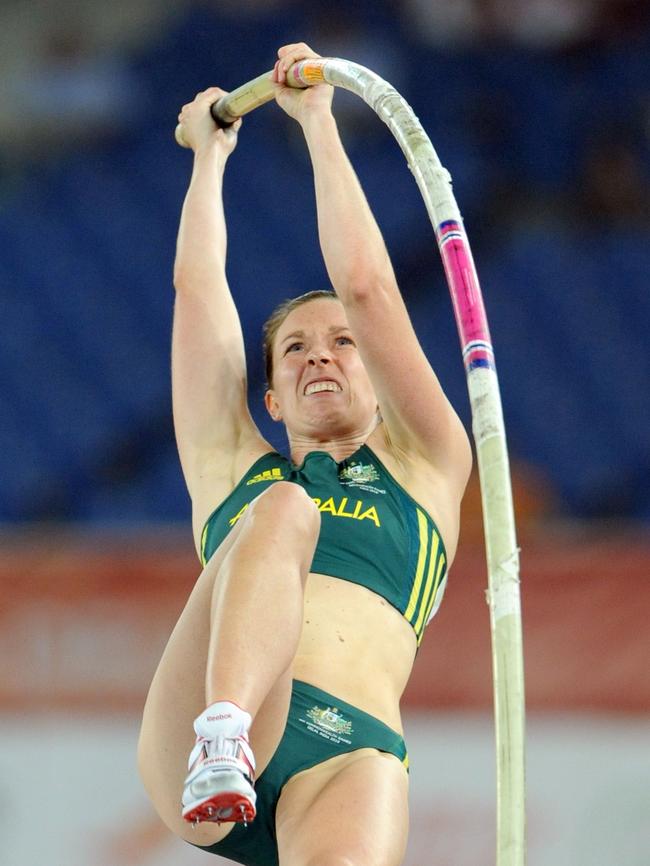
Now, coming back to train with Dad, I feel the relationship works better. It ran its course with my coach in Perth and I felt it was in my best interests to be coached by Dad.”
Alana, who works in human resources, and Matt, a town planner, both work in Brisbane and train five or six days a week, commuting and training together on the Sunshine Coast. Alana insists there is no more pressure to defend her title than any other athlete who “puts it on themselves to perform at their best”. “I’m living out of a bag in my [car] boot,” she says, “but I don’t see it as a sacrifice. It’s a choice I’ve made. I’ve had so many great experiences. I’ve travelled the world and the opportunities have been well worth the effort I’ve put in. There’s absolutely no regret.
“You’re a long time retired. I can work for the rest of my life whereas I can’t pole vault at an elite level. I don’t want to let that opportunity pass me by. The next couple of years, I’m going to give it everything and see how well I can do. I still feel
I can jump higher and achieve more. A gold medal definitely makes it all worthwhile. Standing on the dais and having the national anthem sung and being draped in an Australian flag – it’s pretty special. It melts away all the pain.”
Matt Boyd admits to some nerves in finally fulfilling the dream he’s had “forever”. “It’s been a long time coming,” he says. “Four years ago I was close to qualifying but just missed it. I can’t wait to get over there. I’ve wanted to go to the Commonwealth Games since primary school. Every time I’ve ever answered a question at school about what my aims are, I have said: ‘To compete in the Commonwealth and Olympic Games’.
“It’s definitely a dream come true.” l
The XX Commonwealth Games, Glasgow, July 23-August 3.

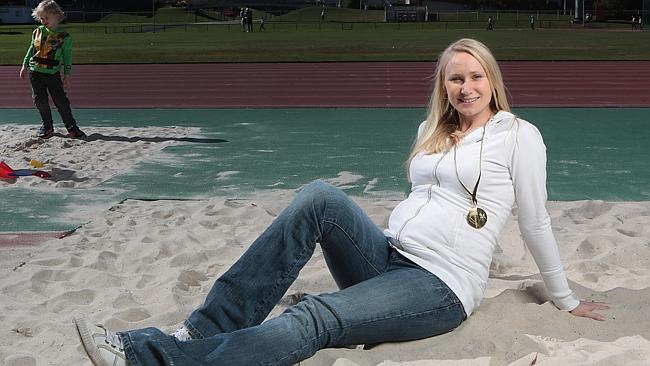
Stars and scandals: Warts and all history of the Broncos
The Broncos swept into the national rugby league in 1988 and have barely been out of the spotlight since. These are the stories of the superstars and scandals of a NRL giant. SPECIAL REPORT
An almost living organism: What it takes to run Brisbane Airport
The self-described mayor of Brisbane Airport oversees one of Queensland’s most complex operations. WELCOME TO HIGH STEAKS